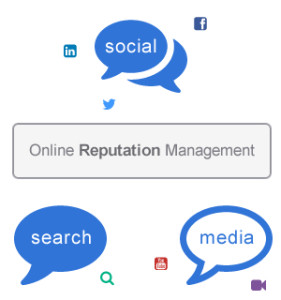 In the fast flowing digital age it is vital that businesses owners and marketers understand reputation management and how poor online reputations can damage their company’s sales. The cost of a poor reputation is almost un-quantifiable and should not be under-estimated. If you do a search for your company’s name, what do you see in the search engine results pages? If you see negative reviews, complaints and other potentially damaging pages, what can you do about it?
In the fast flowing digital age it is vital that businesses owners and marketers understand reputation management and how poor online reputations can damage their company’s sales. The cost of a poor reputation is almost un-quantifiable and should not be under-estimated. If you do a search for your company’s name, what do you see in the search engine results pages? If you see negative reviews, complaints and other potentially damaging pages, what can you do about it?
Reputation Management is about managing the results that new prospects and other searches see when they search for your brand or company name. It is about combating the negativity, building positivity and taking control of your reputation online.
Getting a bad reputation
Business owners can spend a lot of time and money developing a brand and it can be very disconcerting to see negative comments about the brand online. Comments are often isolated and can be un-true, but nevertheless this can jeopardise your reputation.
Many business owners don’t consider the wider impact of a negative brand image and that most potential opportunities will search for you and your business, often before making contact. Negative comments can lead to potential losses in sales, recruitment, press and PR and because new comments often feature high in the results pages because they are considered fresh and new content, any isolated negativity can lead to missed opportunities for a long time to come.
Sometimes a business can be affected by a small number of individuals who seem to have a vendetta against them. With the advent of social media individuals can often anonymously set out to cause harm to a company, for whatever reason. All is not lost, negative comments can be countered and there are proactive things that you can be doing to support a positive reputation online.
Managing your online reputation
Reputation Management is the safe-guarding of your brand or business name’s reputation online. Search for your brand and review the pages that have been indexed that mention you, what do you find? If the results could be better, here are a few tips on what you can do:
1. Search Engine Visibility: The search engine results are made up of pages because they are visible. In theory the competition for your brand name should be relatively low (depending on what it is) and so ensuring that you have your brand represented by pages that you control for as much of the top 10 as possible is important.
2. Blog: Write a blog that is external to your website but that is clearly associated with your brand. By doing some simple SEO techniques into your blog page for your brand name you should be able to increase your visibility within the top 10 of the results pages. Use a domain name for your blog that includes your brand name.
3. Company Pages: Google is by far the most commonly used search engine in the UK and Google My Business is the new name for the Google Places / Google+ Local directory service. Ensure you have a company page set-up as this can perform independently within the results. It is also a good idea to add the Google+ Publisher to your website which creates authorship for your website pages which can help within the results. We recommend you do the same with as many business related social networking services as possible, this includes Linked In, YouTube channel and Pinterest as all pages can rank well within the results.
4. Social Channels: Ensure that you have a social media profile set-up with Facebook and Twitter and try to use them. Even putting a small amount of content out on a monthly basis can help you to gain positions within the results pages for your brand. At the very least you should have control of these pages to prevent anyone from hijacking the page and commenting in your name, but it is easy to set-up an account with a social media management tool to provide a regular stream of information which will be picked up in the indexes.
5. Gain fans: Encourage your customers to leave reviews, to post videos and leave other positive comments about you. Over time the positive comments will outweigh the negative ones.
6. Content writing: Use article based websites to post thought leadership articles from your sector and ensure you promote your brand within it. Many will enable you to include a single link and authorship and use this to strengthen your brand name.
By doing these things you can not only over-turn a negative online reputation but you can also be proactive in managing a positive reputation online.